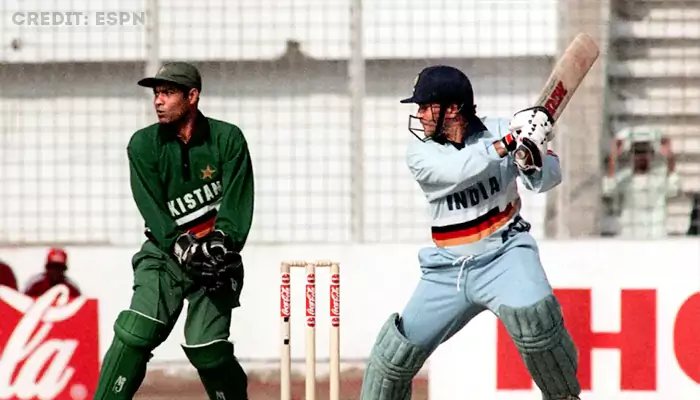
How the 1997 Pepsi Independence Cup brought cricket’s giants together for a celebration unlike any other
The summer of 1997 was more than just another cricket season. It was a stage set for something greater, woven into India's post-independence history. As the country celebrated 50 years of self-rule, cricket reflected its hopes—vibrant, competitive, and unifying.
The Board of Control for Cricket in India, with Pepsi as the main sponsor, launched the Independence Cup: a four-team ODI competition inviting Sri Lanka, PAK, and New Zealand to play in India in a celebration of sport and symbolism.
From the outset, the tournament was rich with symbolism. The trophy bore a gold-etched image of Mahatma Gandhi’s Dandi March—an icon of resistance and determination. Matches took place across India’s renowned venues: Eden Gardens in Calcutta, the Wankhede Stadium in Mumbai, and the M. Chinnaswamy Stadium in Bangalore.
The early rounds displayed the unpredictable nature of sport: New Zealand shocked PAK in Chandigarh; India easily defeated the Kiwis in Bangalore; Sanath Jayasuriya struck 151* against India in Mumbai, setting a new national record for Sri Lanka.

Credit: Cricket Country
But the cricket was only part of the spectacle. In a moment filled with nostalgia, every living Test captain of India—from the octogenarian Lala Amarnath to the youthful Sachin Tendulkar—was paraded around Eden Gardens before a loud 75,000-strong crowd. They received silver salvers, Vijay Hazare the C.K. Nayudu Trophy, and something much rarer: an unbroken ovation from a city that deeply cherishes its cricketing history.

Credit: India Today
The tournament's narrative was rich with personal milestones and cricketing firsts. PAK's Saeed Anwar rewrote ODI history in Chennai, hammering 194 off 146 balls against India—a record that would stand for over a decade. Arjuna Ranatunga's Sri Lanka, just a year after their World Cup triumph, demonstrated their dominance with ruthless consistency.
Jayasuriya scored 306 runs across the tournament, adding five wickets for good measure, and was rightfully named player of the series. PAK's Saqlain Mushtaq was equally relentless, leading the bowling charts with 14 scalps.

Credit: @sportstarweb
India's campaign was less glittering. After their opening victory, they faltered against both Sri Lanka and PAK, finishing with just two points in the round-robin table. Absent were Mohammad Azharuddin, dropped from the squad, and Javagal Srinath for part of the series due to injury—gaps that proved costly. Yet, even in defeat, there were flashes of brilliance: Rahul Dravid's 107 in the face of Anwar's assault, Tendulkar's measured 117 against New Zealand.

Credit: @sportstarweb
The best-of-three finals saw Sri Lanka face PAK in a contest that promised fireworks but became one-sided. In Chandigarh, Jayasuriya's score of 96 from 67 balls set the stage for a dominant 115-run victory.
At Eden Gardens, Aravinda de Silva's calm 59 and Muttiah Muralitharan's 3 for 40 secured an 85-run win, eliminating the need for a third match. An 85,000-strong crowd—remarkably, for a game not involving India—witnessed Sri Lanka's crowning as champions.

The 1997 Pepsi Independence Cup was more than just a cricket tournament. It was a merging of history and sport, where every delivery, every run, seemed to resonate with half a century of freedom.